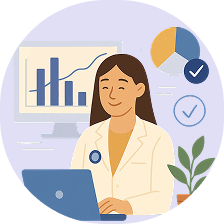WHAT WE TREAT
Addiction and substance use disorders
Through evidence-based practices and personalized care, we empower individuals with the support and resources they need to overcome addiction and achieve lasting recovery. Our goal is to break the cycle of addiction, promote awareness, and foster a community free from stigma, where individuals can find hope and embrace a healthier future.
And many more…


What is addiction and how do we treat it?
Addiction occurs when someone uses a substance like drugs or alcohol too much, or participates in an activity like gambling or gaming to the point where it causes significant problems in their life. In some cases, people struggling with addiction may also suffer from anxiety, depression, or other mental health conditions.
Through counseling, individuals can explore the underlying causes of their addiction, develop coping strategies, and learn healthier ways to manage stress and cravings. Our trained Geode Health counselors provide support, guidance, and a safe space to discuss challenges and progress. By working together with a Geode provider, individuals can gain insight, build resilience, and ultimately achieve lasting recovery.
Medication-Assisted Treatment (MAT) has demonstrated significant effectiveness in numerous studies for supporting individuals in addiction recovery. These medications function by diminishing cravings, blocking the impact of drugs or alcohol, and stabilizing brain chemistry, thereby providing helpful addiction treatment.
Some of the most commonly prescribed medications used to treat addiction are:
Vivitrol®: This extended-release injection form of naltrexone aids in addressing alcohol and opioid use disorders.
Suboxone® and Sublocade®: These prescription medications are utilized for managing opioid use disorder. When incorporated into a comprehensive treatment regimen, Suboxone® proves effective in preventing relapse and sustaining recovery.
Frequently Asked Questions About Substance Use and Addiction Disorders
Substance abuse and addiction can affect anyone, and recognizing the signs early can be crucial for getting help. Some common signs and symptoms include:
- Cravings: Feeling a strong urge or desire to use drugs or alcohol regularly.
- Loss of Control: Finding it difficult to limit or stop substance use despite repeated attempts.
- Withdrawal Symptoms: Experiencing physical or emotional symptoms when not using the substance.
- Tolerance: Needing more of the substance over time to achieve the same effects.
- Neglecting Responsibilities: Prioritizing substance use over important obligations like work, school, or family.
- Relationship Problems: Experiencing conflicts or deterioration in relationships due to substance use.
- Health Issues: Experiencing physical or mental health problems as a result of substance use.
If you or someone you know is experiencing these signs, it’s essential to seek help and support. Recovery is possible with the right treatment and support system. Don’t hesitate to reach out to a healthcare professional or addiction specialist for guidance and assistance.
Alcohol use disorder is characterized by a pattern of alcohol consumption that leads to significant impairment or distress. People with alcohol use disorder may have difficulty controlling their alcohol intake and may continue to drink despite the negative consequences.
Treatment for alcohol use disorder typically involves a combination of therapy, medications, and support groups.
Smoking addiction is characterized by an intense craving for cigarettes and difficulty quitting smoking even when there are negative consequences. People with smoking addiction often have difficulty controlling their behavior and may smoke even when they know it is bad for them.
Treatment for smoking addiction typically involves a combination of therapy and medications, such as nicotine replacement therapy or prescription medications. Behavioral therapy can help individuals develop coping skills and strategies to manage cravings and triggers, while medications can help reduce withdrawal symptoms and nicotine cravings.
Therapy for substance abuse and addiction is a collaborative process where you work closely with your Geode therapist to overcome challenges and achieve lasting recovery.
In therapy sessions, you’ll explore thoughts, feelings, and behaviors related to substance use, identify triggers, develop coping skills, and set achievable goals for recovery. Therapy is personalized to your needs and may involve approaches like cognitive-behavioral therapy (CBT) or motivational interviewing. It’s a supportive space where you can address underlying issues and learn strategies to prevent relapse. With dedication and support, recovery is possible.
Relapse can be a common part of the addiction recovery journey for many individuals, but it doesn’t mean failure. It’s important to understand that addiction is a chronic disease, and setbacks can happen. What matters most is how you respond to relapse. It’s an opportunity to learn and grow stronger in your recovery journey. Your Geode Health Provider will help guide you through this process of recovery, helping your journey towards lasting sobriety. Remember, you’re not alone, and recovery is possible.
Supporting a loved one struggling with addiction involves offering nonjudgmental support, encouraging them to seek treatment, setting boundaries to protect yourself, educating yourself about addiction, being patient throughout their recovery journey, avoiding enabling behaviors, and seeking support for yourself to cope with the challenges. Your support can make a significant difference in their path to recovery.



Access a world of expertise within every Geode Practice
Depending on your needs and preferences, choose to see our providers face-to-face, or online. We’ll get you connected with the expertise you need to feel better.
If you are in crisis and in need of immediate support
Please call the National Suicide Prevention Lifeline by dialing 988 or text the Crisis Text Line by texting HELLO to 741741


